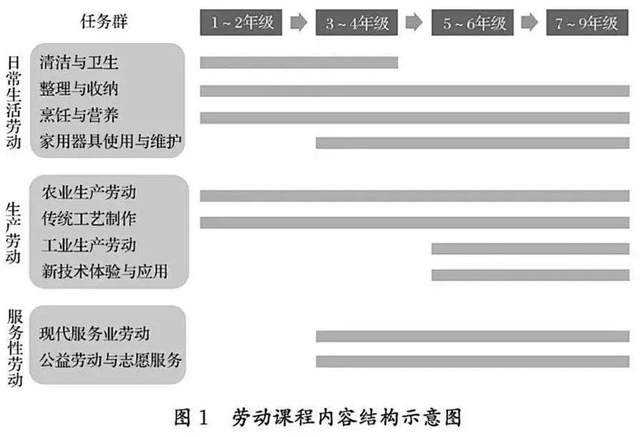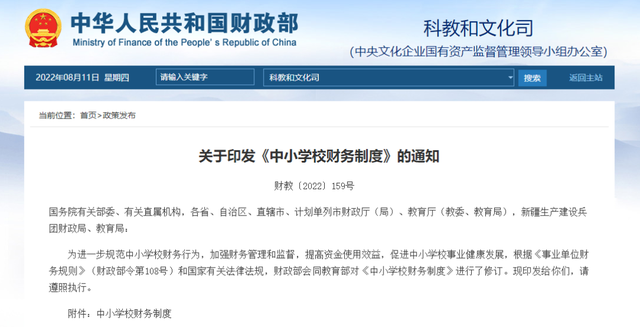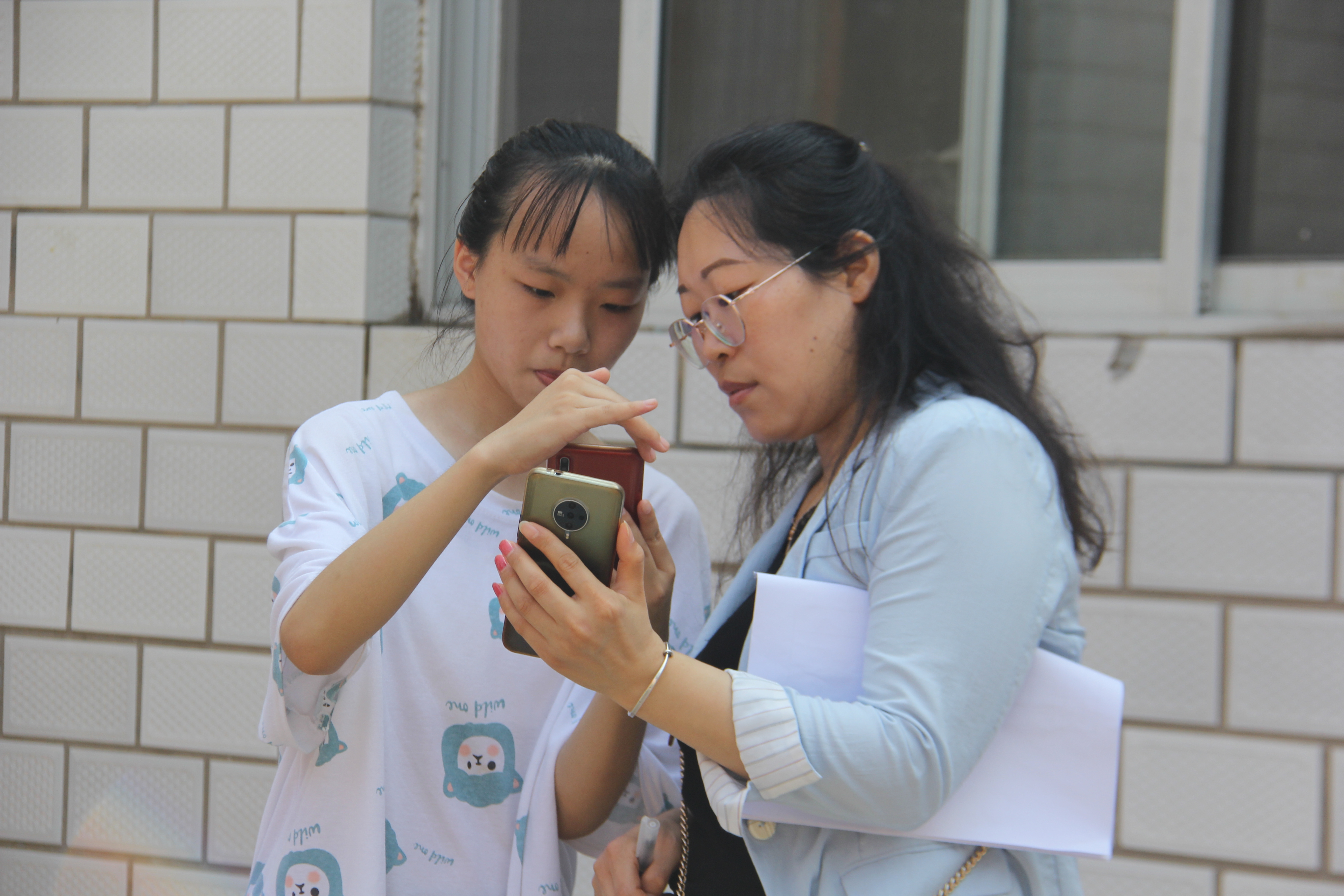Please pay attention!From September 1st, these educational policies will be implemented!
Author:Qilu.com Time:2022.08.16
Starting from the new semester of September this year, some new education policy will be implemented one after another, related to each family and every student. What educational policies will be officially implemented? Let's look at it ———
1. Labor class will officially upgrade to an independent course in primary and secondary schools
In April of this year, the Ministry of Education issued the "Compulsory Education Curriculum Plan" and released the "Compulsory Education Labor Curriculum Standard (2022 Edition)". This fall, the labor course will officially become an independent course for primary and secondary schools.
What is a "labor course"?
The compulsory education courses are based on rich and open labor projects. The focus is on the purpose of organizing students to participate in daily life labor, production labor and service labor, so that students can practice, sweat forces, accept exercise and tempering will. Cultivate students' correct labor values and good labor quality.
According to the compulsory education curriculum plan, the average time of labor courses is not less than one lesson per week, and it is used for activities planning, skills guidance, practice practice, and summarizing exchanges. At the same time, this course focuses on evaluating the multi -dimensional content, diverse evaluation methods, and diverse evaluation subjects.
-It not only pay attention to labor knowledge and skills, but also pay attention to labor concepts, labor habits and quality, and labor spirit; we must pay attention to the results of labor and the performance of the labor process.
-When the combination of the usual performance evaluation with the comprehensive evaluation of the semester, the combination of qualitative evaluation and quantitative evaluation.
-For the evaluation of teachers, encourage students, other discipline teachers, parents, etc. to participate in the evaluation.
What are the work courses?
The content of the labor course has a total of ten task groups, and each task group consists of several projects.
Daily labor includes four task groups: clean and hygienic, sorting and storage, cooking and nutrition, and home appliances. Production labor includes four task groups: agricultural production labor, traditional process production, industrial production labor, and new technology experience and application. Service labor includes two tasks: modern service industry labor, public welfare labor and volunteer services.
Whether the course is linked to the middle and college entrance examination
According to experts, the current curriculum standards and policy requirements have not incorporated labor education into the high school entrance examination.
In 2020, the Central Committee of the Communist Party of China and the State Council issued the "Opinions on Comprehensively Strengthening Labor Education in New Era, Elementary and Middle Schools in the New Era", and proposed that the results of labor literacy evaluation were used as an important part of measurement of the comprehensive development of students, as an important reference and graduation basis for the evaluation and evaluation. As an important reference or basis for admission to high -level schools.
"Labor education is an evaluation of comprehensive quality of process, focusing on examining the process and performance of students' labor practice. It cannot be simply evaluated by exams like Chinese and mathematics." Fan Yongfeng, a professor at the Department of Education of Southwest University Students' gains and growth, such as the improvement of labor skills and the development of labor habits.
2. The first semester of the first grade is set as admission adaptation period
In March 2021, the Ministry of Education issued the "Guiding Opinions on Everbright Promoting the Connection of Kindergarten and Primary Schools" (hereinafter referred to as "Guidance Opinions"), comprehensively promoted the implementation of admission preparation and adaptation education for kindergartens and primary schools to slow Realize the transition from kindergarten to elementary school. The "Guidance Opinions" requires that on the basis of studying and analyzing the effectiveness of admission and admission to the effectiveness of education, and sorting out and summarizing the pilot work experience, starting in the fall semester of 2022, all provinces (autonomous regions, municipalities) have comprehensively implemented admission preparation and adaptation education.
Key tasks and main measures
This opinion focuses on the two main bodies of kindergartens and elementary schools, strengthen the connection force, and propose five young connection measures:
The first is that kindergartens implement the preparation of admission preparations to help children prepare for many aspects such as life, society and learning.
Second, primary schools implement adaptive education education, set the first grade last semester to adaptation period, reform the first grade education and teaching methods, and strengthen the connection with kindergarten education.
Third, the teaching and research departments should establish a young joint teaching and research system, and guide primary school and kindergarten teachers to strengthen cooperation and research in courses, teaching, and management.
Fourth, kindergartens and primary schools should establish home education mechanisms to help parents understand excessive strengthening of knowledge preparation, study the harm of primary school curriculum in advance, and actively cooperate with the connection.
Fifth, the education department must integrate resources of all parties, coordinate the promotion of connection work, and further strengthen the continuous governance of violations of education laws of off -campus training institutions.
"Guidance Opinions" attachment "Kindergarten Entry Preparation Education Guidance Point" (hereinafter referred to as "Admission to Entry Preparation") and "Primary School Entrance Adaptation Education Guidance Points" respectively put forward specific, which can Operation guidance.
The "Admissions Points for Entry Administration" requires that primary schools should strengthen the awareness of connection and take adaptation education as an important task of deepening compulsory education curriculum teaching reform. It is included in the first grade education and teaching plan. Education and teaching methods are connected with kindergarten education. The first grade of primary school was an adaptive period of adaptation to the adaptive adaptation of the child, adapting adaptation education that connects with kindergarten, reasonably arrange the content of the first -year curriculum, reform the education and teaching methods, and strengthen the inquiry and experiential learning of children as the main body. Take the stairs of growing up and adapting to help children gradually adapt to the transformation from game activities -based to classroom teaching.
3. Compulsory education curriculum plan and curriculum standard (2022 edition) Start implementation
In April this year, the Ministry of Education issued 16 curriculum standards such as compulsory education curriculum and Chinese (2022 edition). The current compulsory education curriculum schemes and curriculum standards have been implemented for more than 20 and 10 years, respectively. The revision of the compulsory education curriculum has been launched in 2019. It takes 3 years. The new version of the compulsory education curriculum plan and curriculum standard will be implemented in the fall semester of 2022. What are the changes in compulsory education curriculum schemes and curriculum standards
The person in charge of the Education Materials Bureau of the Ministry of Education asked the reporter for the "Compulsory Education Curriculum Plan and Curriculum Standard (2022 Edition)":
In terms of curriculum
The first is to improve the training goals. Combined with the nature of compulsory education and curriculum positioning, from the three aspects of ideal, identical, and responsible, clarify the specific requirements of newcomers in the period of compulsory education.
The second is to optimize the curriculum settings. Integrate the original ethics and life of primary schools, morality and society and junior high school thoughts and morality as "morality and the rule of law", and carry out nine -year integrated design; reform art courses setting up in grades to the seventh grade as the main line of music and art to integrate dance, drama, film and television and television For the content of the eighth to ninth grades, the selection of the scientific and comprehensive practice activities will be established to the first grade; the central requirements will be implemented, and the labor, information technology and their course will be independently used in the course of comprehensive practice activities.
The third is to refine the implementation requirements. Increase the basic requirements of curriculum standard preparation and teaching materials; clarify the responsibilities, institutional norms of provincial education administrative departments and school curriculum, as well as the direction of teaching reform and evaluation reform, and put forward specific requirements for training and teaching and scientific research; improve the implementation mechanism, strengthen monitoring monitoring With supervision requirements.
In terms of curriculum standards
First, the standards of each curriculum are based on compulsory education and cultivation goals, and detailed the party's education policy into the core literacy of students that should be cultivated in this course, reflecting the training requirements of correct values, must -have character and key abilities. For example, the course of morality and the rule of law clarifies the training requirements of political identity, moral cultivation, the concept of rule of law, improvement of personality, and responsibility awareness.
The second is to optimize the curriculum content structure. Based on core literacy requirements, select important concepts, theme content and basic knowledge and skills, select and design courses, and optimize organizational forms. Different subjects involving the same content themes, based on their own nature and educating value, do a good job of coordination with the overall planning and division of labor. Establish a cross -disciplinary theme learning activity, strengthen the interrelationship between disciplines, drive the comprehensive implementation of the curriculum, and strengthen the requirements of practice.
The third is to develop academic quality standards. Based on the level of core literacy development and combined with the content of the curriculum, the overall description of the specific performance of students' academic achievements in the university, forming academic quality standards, guiding and helping teachers to grasp the depth and breadth of teaching, and provides a basis for teaching materials writing, teaching implementation, and examination evaluation.
The fourth is to enhance guidance. The standards of each curriculum propose "academic requirements" and "teaching tips" for "content requirements", refine the evaluation and examination proposition suggestions, pay attention to the consistency of teaching, learning, and entrance examination, and increase the cases of teaching and evaluation. Not only does it clarify "why why why" why why "why why" why "why" why "why" Teaching "what to teach" and "to teach", and strengthen the specific guidance of "how to teach", so as to be easy to use and manage.
The fifth is to strengthen the connection of the semester. Pay attention to the "young connection". Based on the assessment of the development level of students in the development of health, language, society, science, and art, reasonably designed primary school first to second courses, and focuses on the learning and design of activity, gaming, and life. Based on the development and changes of students from elementary school to junior high school in junior high school, grasping the depth and breadth of the curriculum, reflecting the continuity and advancement of learning goals. Understand the characteristics and discipline characteristics of high school, and prepare for students to learn further.
Fourth, compulsory education phases shall not engage in business activities (in accordance with relevant national regulations)
On August 11, the Ministry of Finance issued the newly revised "Financial System of Primary and Middle Schools" (hereinafter referred to as the "System").
The "System" was officially implemented from September 1, 2022. All localities and schools can use the summer vacation of primary and secondary schools to carry out personnel training, formulate implementation rules, and revise the supporting system. The Ministry of Finance will pay close attention to the implementation of the "System", continue to follow up and question, guide primary and secondary schools to effectively improve the level of financial management, and ensure that the "System" is implemented.
Compared with the original "System", the new "System" faces new situations and requirements facing major policies such as "double reduction", student nutrition improvement plans, and expanding inclusive preschool education resources, and coordinate the weak school financial management. In the link, the focus is on six aspects:
The first is to adjust the scope of the "System", and no longer require the implementation of this system of primary and secondary schools organized by the social forces of the state's regular funding.
The second is to clarify the financial management of party organizations to lead primary and secondary schools.
The third is to strengthen the construction of the school's financial team, and add the school's financial supervisors and finances, the position settings of the accounting personnel, the responsibilities and authority, and the conditions of the job.
Fourth, the school adopts independently operating cafeteria, entrusted canteen, dining or entrusted meals and other methods to provide the actual situation of meals for students, and put forward financial management requirements for classification.
Fifth, to clarify the management requirements of service charges such as after -school services, increase primary and secondary schools that must not expand the scope of fees without authorization, increase charging items, and increase the prohibition of charging standards, and strengthen the guidance of local implementation of "double reduction" policy and financial behavior.
Sixth, in accordance with the new "Financial Rules of Institutions", the content of budget management, asset management, and financial reporting system should be adjusted and refined accordingly.In addition, the cafeteria of primary and secondary schools should adhere to the principles of public welfare and non -profit.The compulsory education stage shall not engage in business activities in accordance with relevant state regulations.
Source: China Education News




